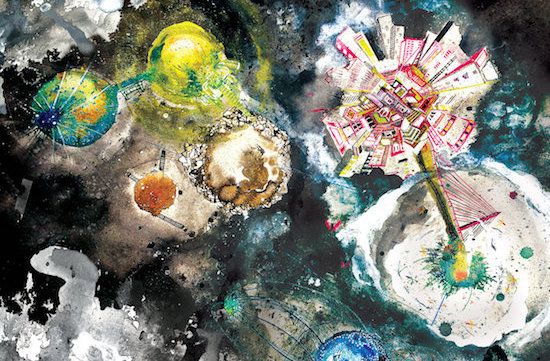There is an intimacy in this album, this single 50-minute composition. It’s not the intimacy of pop or rock, where you might get absorbed and begin to feel that it’s actually you who is always hanging in a buffalo stance or whose beautiful wife and beautiful house this is not. There are almost no lyrics on Multum In Parvo, for one thing, so you can’t be absorbed into the singer’s persona; not only that but in a sense there are no instruments either – that is, Barton made this record using an Epoch Modular Benjolin and his beloved Buchla Music Easel, so where your brain might normally recognise a bass or a violin or a saxophone, here there are other, new noises which you can’t identify. Or if you can, you’re identifying a suggestion of a welcoming space, a sense of soft adventure or maybe a feeling of giddiness. There are moments (say if you’re listening on headphones in bed at 4am because you can’t sleep) when you might identify the tiptoeing-in presence of new spirit friends, or the opening up of an infinitely richer parallel world, or the industrious-joyful moods and unknown-to-us communications of termites as they build their palace. Maybe it’s true that, as Barton warns/promises, “If you listen to a Buchla, it will start rewiring your synapses.”
Todd Barton made Music & Poetry Of The Kesh with Ursula K Le Guin (re-released earlier this year), and on that extraordinary album he and Le Guin created a very real imaginary place. The Kesh was originally released to accompany Le Guin’s 1985 book Always Coming Home, an ‘imagined ethnography’ with poems and music as well as details of customs, architecture, taboos, linguistics, tools, instruments, gossip, all relating to the peaceful and extremely appealing Kesh people, who “might be going to have lived a long, long time from now in Northern California”. Theirs was a playful and serious creative process, an uncovering of artefacts that did and didn’t already exist, as described in Barton’s interview with tQ in May. Multum In Parvo does a similar thing – it creates a very real imaginary place, and then it weaves that imaginary place into exactly where you are right now. I’ve listened to Multum In Parvo a dozen times or more and I’ve never heard the same album twice, because I change and my mood changes but also because incidental noises in my body and my surroundings – from sighs to car horns to distant giggles – all seem to be on very friendly terms with Todd Barton and his Buchla.
This created space for others is one reason why this record might make you think of John Cage and his 4’33” – which is not silence, after all, but unpredicted noises, a giving up of control, by the writer and the audience, a playful and very serious leap into undirected possibilities. That Latin title, Multum In Parvo, suggests getting a great deal out of very little. And there is a great deal here: Barton trusts you to recognise the abundance, and to understand that you’re part of it yourself. There’s enough quiet, especially at the beginning, to make it clear that this music is making room for you; this album is also populated by your internal and external world. The Buchla synth and those spirit friends play together with your breath, or maybe a sniff or a sneeze or a creaky knee, and a conversation passing your window or a bus in the distance or cat mewing in the next room.
In the last couple of minutes, something begins to ascend and relax, there’s a fuzz and a bubbly cuddling and a reaching out: you could be standing alongside François Truffaut or Karen Carpenter, trying to tune in to the tantalising, soft communications of friendly extraterrestrials. Earlier on, the brief point where a lyric comes in as if from a not-quite-tuned frequency puts you in a specific-but-unknowable location, too: “Call you on the telephone”, it sings, and it sounds excavated, mournful, hopeful. (It sounds half remembered, in fact, like a flashback to a song you loved decades ago, something both spooky and comforting, like parts of The Caretaker’s Everywhere At The End Of Time project or something from a benevolent version of The Shining soundtrack.)
Most of the time, though, this record is even less directive than that. It’s more like a meditation, where you find out and accept whatever kind of mood you’re in rather than trying to change it, or where you uncover stories and connections that disappear again a few minutes later. Another bit of Latin: Barton points out in another recent interview that the word compose means “to put together” – like any artist, he is working with something that’s already there. And as you listen (or read) you become part of the process of uncovering it.
Accepting her National Book Award in 2014, Ursula Le Guin talked about “so-called realists”, in literature and elsewhere, and about the need for resistance and change and imagination. “Hard times are coming,” she said, “when we will be wanting the voices of writers who can see alternatives to how we live now and can see through our fear-stricken society and its obsessive technologies to other ways of being, and even imagine some real grounds for hope. We will need writers who can remember freedom. Poets, visionaries – the realists of a larger reality.” You can see, can’t you, why she was such good friends with Todd Barton. His music is a deeply enjoyable lesson, a fun lesson in following possibilities, embracing unknown outcomes, and sharing the harvest wholeheartedly with everyone.


